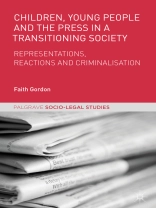This book assesses the implications of how children and young people are represented in print media in Northern Ireland – a post-conflict transitioning society. Gordon analyses how children and young people’s perceived involvement in anti-social and criminal behaviour is constructed and amplified in media, as well as in popular and political discourses. Drawing on deviancy amplification, folk devils and moral panics, this original study specifically addresses the labelling perspective and confirms that young people are convenient scapegoats – where their negative reputation diverts attention from the structural and institutional issues that are inevitable in a post-conflict society. Alongside content analysis from six months of print media and a case study on the representation of youth involvement in ‘sectarian’ rioting, this book also analyses interviews with editors, journalists, politicians, policy makers and a spokesperson for the Police Service of Northern Ireland. Noting the importance of prioritising the experiences of children, young people and their advocates, this timely and engaging research will be of specific interest to scholars and students of criminal justice, criminology, socio-legal studies, sociology, social policy, media studies, politics and law, as well as media professionals and policy makers.
Inhaltsverzeichnis
PART I: THE THEORETICAL CONTEXT.- Chapter 1. Researching the Media Representations of Children and Young People in Northern Ireland.- Chapter 2. The Significance and Impact of the Media in Contemporary Society.- Chapter 3. The Impact of Social Reaction on Contemporary Policy Responses to Children and Young People.- PART II: MEDIA REPRESENTATIONS, SOCIAL REACTION AND THE IMPACT.- Chapter 4. Print Media Content Analysis.- Chapter 5. Reading the ‘Riots’.- Chapter 6. ‘It’s the Nature of the Beast’.- Chapter 7. ‘The Hidden Voices’ in the Media.- PART III: CHALLENGES AND FUTURE POLICY RESPONSES.- Chapter 8. Reading Between the Headlines
Über den Autor
Faith Gordon is a Lecturer in Criminology and Director of the Youth Justice Network at the University of Westminster, UK. She is also a Research Associate at the Information Law and Policy Centre, the Institute of Advanced Legal Studies.












